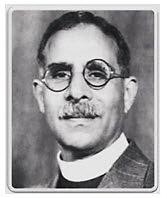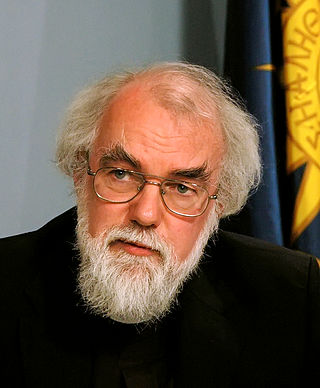
Rowan Douglas Williams, Baron Williams of Oystermouth, is a Welsh Anglican bishop, theologian and poet. He was the 104th Archbishop of Canterbury, a position he held from December 2002 to December 2012. Previously the Bishop of Monmouth and Archbishop of Wales, Williams was the first Archbishop of Canterbury in modern times not to be appointed from within the Church of England.

The terms Muslim world and Islamic world commonly refer to the Islamic community, which is also known as the Ummah. This consists of all those who adhere to the religious beliefs and laws of Islam or to societies in which Islam is practiced. In a modern geopolitical sense, these terms refer to countries in which Islam is widespread, although there are no agreed criteria for inclusion. The term Muslim-majority countries is an alternative often used for the latter sense.

Henry Martyn was an Anglican priest and missionary to the peoples of India and Persia. Born in Truro, Cornwall, he was educated at Truro Grammar School and St John's College, Cambridge. A chance encounter with Charles Simeon led him to become a missionary. He was ordained a priest in the Church of England and became a chaplain for the British East India Company.
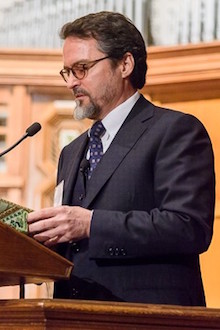
Hamza Yusuf is an American Islamic neo-traditionalist, Islamic scholar, and co-founder of Zaytuna College. He is a proponent of classical learning in Islam and has promoted Islamic sciences and classical teaching methodologies throughout the world.

John Louis Esposito is an American academic, professor of Middle Eastern and religious studies, and scholar of Islamic studies, who serves as Professor of Religion, International Affairs, and Islamic Studies at Georgetown University in Washington, D.C. He is also the founding director of the Prince Alwaleed Center for Muslim–Christian Understanding at Georgetown.

Timothy John Winter; 15 May 1960 is an English academic, theologian and Islamic scholar who is a proponent of Islamic neo-traditionalism. His work includes publications on Islamic theology, modernity, and Anglo-Muslim relations, and he has translated several Islamic texts.
Ashraf Ali Thanwi (often referred as Hakimul Ummat and Mujaddidul Millat was a late-nineteenth and twentieth-century Sunni scholar, jurist, thinker, reformist and the revival of classical Sufi thought from Indian subcontinent during the British Raj, one of the chief proponents of Pakistan Movement. He was a central figure of Islamic spiritual, intellectual and religious life in South Asia and continues to be highly influential today. As a prolific author, he completed over a thousand works including Bayan Ul Quran and Bahishti Zewar. He graduated from Darul Uloom Deoband in 1883 and moved to Kanpur, then Thana Bhawan to direct the Khanqah-i-Imdadiyah, where he resided until the end of his life. His training in Quran, Hadith, Fiqh studies and Sufism qualified him to become a leading Sunni authority among the scholars of Deoband. His teaching mixes Sunni orthodoxy, Islamic elements of belief and the patriarchal structure of the society. He offered a sketch of a Muslim community that is collective, patriarchal, hierarchical and compassion-based.

Syed Ata Ullah Shah Bukhari , was a Muslim Hanafi scholar, religious and political leader from the Indian subcontinent. He was one of the Majlis-e-Ahrar-e-Islam's founding members. His biographer, Agha Shorish Kashmiri, states that Bukhari's greatest contribution had been his germination of strong anti-British feelings among the Indian Muslims. He is one of the most notable leaders of the Ahrar movement which was associated with opposition to Muhammad Ali Jinnah and opposition to the establishment of an independent Pakistan, as well as opposition to the Ahmadiyya Movement. He is considered as a legendary rhetoric, which made him famous among the Muslims.
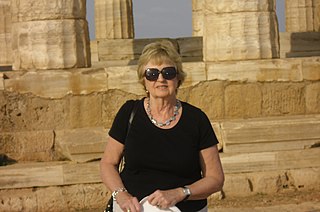
Dame Averil Millicent Cameron, often cited as A. M. Cameron, is a British historian. She is an expert on Late Antiquity, Classics, and Byzantine Studies. She was Professor of Late Antique and Byzantine History at the University of Oxford, and the Warden of Keble College, Oxford, between 1994 and 2010.
Josef (Yousef) Waleed Meri is an American historian of Interfaith Relations in the Middle East and the history of religion.

According to the 2016 census, Islam is practised by 4.1% of the population of Hong Kong, or about 300,000 Muslims. Of this number, 50,000 are Chinese, 150,000 are Indonesians and 30,000 are Pakistanis, with the rest from other parts of the world. The vast majority of Muslims in Hong Kong are Sunni.

Zaid Shakir is an American Muslim scholar and co-founder of Zaytuna College in Berkeley, California. He teaches courses on Arabic, law, history, and Islamic spirituality.
Begumganj is an upazila of the Noakhali District in Bangladesh's Chittagong Division. Begumganj Thana, now an upazila, was established in 1892.

Jane Dammen McAuliffe is an American educator, scholar of Islam and the inaugural director of national and international outreach at the Library of Congress. She is a president emeritus of Bryn Mawr College and former dean of Georgetown College at Georgetown University. As a specialist in the Qur'an and its interpretation, McAuliffe has edited the six-volume Encyclopaedia of the Qurʾān and continues to lead the editorial team for the online edition of the work.
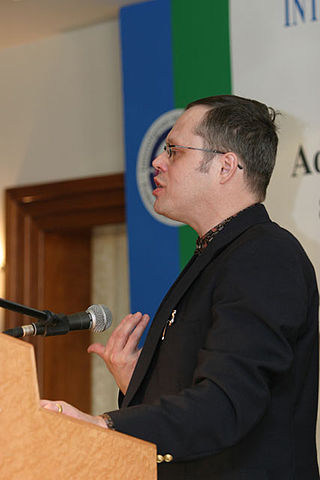
Clinton Bennett is a British-American scholar of Religious studies and participant in interfaith dialogue, specializing in Islamic studies and the relations between Islam and other religions. He is also a published author.
Malik Barkat Ali was an Indian Muslim politician, lawyer and journalist.

Martyn William Percy is a British academic, educator, social scientist and theologian. Ordained as a priest in the Church of England, in 2022 he announced that he was leaving the Church of England, though remains Episcopalian-Anglican. He had been Dean of Christ Church, Oxford, from 2014 to 2022 and principal of Ripon College Cuddesdon, Oxford, from 2004 to 2014.
John Allembillah Azumah is an ordained Ghanaian minister in the Presbyterian Church of Ghana and associate professor of World Christianity and Islam. He is one of the leaders in Islam and Christian–Muslim relations and he is currently working on research in the area of World Christianity and Islam in the Global South.
Gibril Fouad Haddad is a Lebanese-born Islamic scholar, hadith expert (muhaddith), author, and translator of classical Islamic texts. He was featured in the inaugural list of The 500 Most Influential Muslims and has been called "one of the clearest voices of traditional Islam in the Western world", a "prominent orthodox Sunni" and a "staunch defender of the traditional Islamic schools of law." He holds ijazas from over 150 scholars across the Muslim world. He was a visiting fellow (2013-2015) then senior assistant professor (2015-2018) at the Sultan Omar Ali Saifuddin Center for Islamic Studies, Universiti Brunei Darussalam. He is also a staunch critic of Wahhabism and Salafism.

Syed Ahmad Ullah Maizbhandari was a Bengali Sufi saint and founder of the Maizbhandari Sufi order in Bengal.
